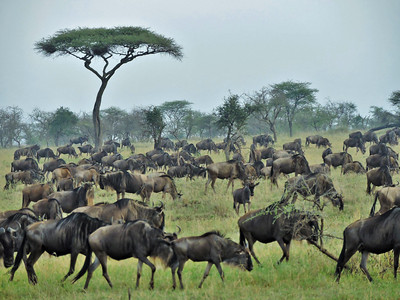Summary | Excerpt | Reading Guide | Reviews | Beyond the Book | Read-Alikes | Genres & Themes | Author Bio

Critics' Opinion:
Readers' Opinion:
First Published:
May 2022, 336 pages
Paperback:
May 2023, 336 pages
 Book Reviewed by:
Book Reviewed by:
Kim Kovacs
Buy This Book
This article relates to The Lioness
 Chris Bohjalian's novel The Lioness is set in Serengeti National Park, a 5,700 square-mile wildlife refuge on the Serengeti Plain of north-central Tanzania. Established in 1951, it was one of the first areas proposed to be a World Heritage Site, obtaining that status in 1981.
Chris Bohjalian's novel The Lioness is set in Serengeti National Park, a 5,700 square-mile wildlife refuge on the Serengeti Plain of north-central Tanzania. Established in 1951, it was one of the first areas proposed to be a World Heritage Site, obtaining that status in 1981.
The park is a subset of the larger Serengeti ecosystem, which spans about 12,000 square miles and includes vast swaths of grassland; indeed, the area's name is derived from a Maasai word meaning "endless plain." The preserve is home to an immense number of ungulates (hoofed mammals) — somewhere around 1.3 million wildebeests (or gnus), 150,000 gazelles and 60,000 zebras — as well as many other animals (lions, hyenas, etc.). Elephants are a relatively recent addition; they established a population in the area in recent decades as humans encroached on their territory in Kenya's Maasai Mara, and now number close to 1,400 within the park.
Around 150,000-200,000 tourists visit Serengeti National Park annually, with many aiming to view The Great Migration, the largest mammal migration on Earth. Every year, millions of animals – primarily wildebeests — make a trek of over 500 miles. They spend the wet season in the southern part of the park, where the grasses are more nutritious but shorter. Because predators are easier to spot in this type of vegetation, the animals breed here as they consume the fresh grass; half a million calves are born in the area from January to March. When the annual drought hits in May, they begin their journey north, where the grass is taller but less nourishing. They move south again in the late fall when the rains return.
The area is also known for its diverse bird population, which ranges, according to the park's website, "from the tiny Beautiful Sunbird that often can be seen hovering around bright Aloe flowers, to the massive ostrich with its pinkish legs and dramatic mating dance." The Serengeti Biodiversity Program has recorded around 540 species of birds in the park, some of which can only be found in this region of Africa; consequently, bird watching is another popular tourist activity.
Unfortunately, the Serengeti region as a whole is threatened by numerous factors today. Climate change is altering the ecosystem, with more droughts in some areas and more intense rainfall in others. Although hunting is prohibited within the park and carefully regulated outside of it, poaching has long been an issue here. Deforestation is also on the rise, as a growing human population seeks wood for energy and trees are illegally logged and shipped away to be used in construction. Water use issues, an increase in invasive species, land degradation from farming and livestock, and unregulated tourism play roles as well.
Wildebeests in Serengeti National Park. Photo by Mike W. (CC BY-SA 2.0)
Filed under Nature and the Environment
![]() This "beyond the book article" relates to The Lioness. It originally ran in June 2022 and has been updated for the
May 2023 paperback edition.
Go to magazine.
This "beyond the book article" relates to The Lioness. It originally ran in June 2022 and has been updated for the
May 2023 paperback edition.
Go to magazine.




A few books well chosen, and well made use of, will be more profitable than a great confused Alexandrian library.
Click Here to find out who said this, as well as discovering other famous literary quotes!
Your guide toexceptional books
BookBrowse seeks out and recommends the best in contemporary fiction and nonfiction—books that not only engage and entertain but also deepen our understanding of ourselves and the world around us.